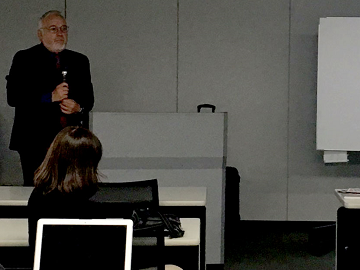Seminar“Digital Terrorism & Hate: The Troubling Growth of Hate & Terror Activity in the Digital Age”
On July 2nd, 2018, Waseda University’s Global Asia Research Center hosted an international seminar, “Digital Terrorism & Hate: The Troubling Growth of Hate & Terror Activity in the Digital Age.” Rabbi Abraham Cooper, Associate Dean and Director of the Global Social Action Agenda of the Simon Wiesenthal Center in Los Angeles, delivered a speech on digital terrorism found in social media.
In the beginning of the speech, Rabbi Cooper recalled a memory of Simon Wiesenthal from 1977. Simon Wiesenthal had predicted that the combination of technology and hate would cause a massive problem in society. Remarkably, 40 years later, it has turned out to be true. In today’s world, young people grow up with technology and develop their own social platforms with their own rules. Some have used technology to spread hatred towards individuals or minority groups.
Rabbi Cooper spoke about the annual report cards that his organization issues on how major social media sites are dealing with hate. In recent years, the Simon Wiesenthal center has proactively engaged with companies that run such sites, and in some cases this led to the adoption of new anti-hate policies. However, as larger sites have increasingly cracked down on hateful content, new companies, which Rabbi Cooper referred to as “Alt-Tech,” have created online platforms that stand against the norm of censoring hateful content.
The speech included many examples of online hate. Some were discovered through the monitoring and analyzing hashtags in social media such at Twitter and Instagram. Certain hashtags were found to often include discriminatory messages and hate related contents. In some cases, Rabbi Cooper noted the existence of hate being mainstreamed through language or images that don’t seem hateful on the surface, but arguably denigrate groups or spread fake news.
Much of the focus of Rabbi Cooper’s speech discussed the use of the internet by terrorist organizations. Through slides that included numerous images of such activities, it was made clear that terrorists and their ideological supporters could attract young people via visually impressive works of propaganda.
Rabbi Cooper also introduced cases related to hate activities in Japan. This included some Japanese Twitter accounts that focus on hatred of Korea and Koreans living in Japan. Compared with the groups in the United States, the number of such users is quite small, but is still a serious issue.
After the presentation, students and faculty had an opportunity to ask questions to the speaker. Some of the issues discussed included the difficulty of balancing freedom of expression with the restriction and regulation of hateful speech. Rabbi Cooper noted that hateful ideas, like any idea, cannot be completely eliminated in the real world. Discussion also touched upon the idea that hate can be reduced by encouraging openness to reconciliation between groups with historical grievances.
Those interested in reading more about the topics discussed by Rabbi Cooper can find more information on the Simon Wiesenthal Center’s Digital Terrorism & Hate website ( http://digitalhate.net )

